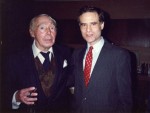Column Name
Title
I first met Harvey Shapiro (Diploma '32, cello) in 1970, when he came to Juilliard to teach Leonard Rose’s students while Rose took a year’s sabbatical to tour with the Istomin-Stern-Rose Trio. Harvey, who died on October 25, was then 59, a year younger than I am now, and already had an illustrious career as a solo, chamber, and orchestral cellist, but he had only recently begun teaching. Word spread fast—and word had it that Harvey was the best cello teacher anywhere, a kind of “cello doctor,” as he was termed by many in the early years. His incredible ear, absolute mastery of the instrument, and knowledge of human psychology was amplified by something all the greatest teachers have: the gift of being able to inhabit the psyche of the student, thereby finding a way to light the spark that begins the road to improvement and ultimate mastery. Perhaps it was this gift that prompted the late great cellist Mstislav Rostropovich to call Shapiro "the greatest cello teacher in the world!"
Body
His students were not only cellists. Violinists, violists, bass players would all be regulars in the Shapiro studio, camping out to watch and listen as he taught. Once, during one of my lessons, the entire Quartetto Italiano showed up. I was intimidated, but eventually learned how better to focus when “the vibes” didn’t feel right. Afterward, I would go home and immediately take out my cello just to see if my playing still sounded as good as it had by the end of the lesson. It felt like magic! Of course, not everything would stick—but in time, more and more of Harvey’s wisdom would become part of me.
Harvey was not an easy teacher, and was not for everyone. A student who could not take criticism in the spirit it was intended did not stay with Shapiro very long. If he sensed a student was stubbornly ignoring his suggestions, he would tell them to go study with someone else. But as long as he felt the student wanted to listen and improve, Harvey would not give up. While he had a reputation for screaming, irascibility, and foul language that could make men who thought they’d seen and heard it all blush, this was always done with love. He would give praise when he felt it was due, and praise from Shapiro really meant something! Of course it was brief, because Harvey had already begun pushing up to the next plateau, constantly raising the bar.
The challenges of adversity seemed to keep him healthy and the juices flowing. He had three different kinds of arthritis for much of his life, but it never deterred him. If he couldn’t play with a certain finger, no matter; he would always find a way out. And he never wanted you glued to the same fingering or bowing for life, either. His students became all the more secure in their technique by learning to change bowings and fingerings based on the demands at hand. Over his life, Harvey dealt with two different kinds of cancer, two broken hips, failing eyesight to the point of blindness—overcoming them all. His ear and mind remained clear as a bell until his final days.
Harvey Shapiro, of Russian parentage, was born on June 22, 1911, in New York City. He was a generous man who enjoyed whiskey, fine wine, and smoked the best Havana cigars throughout most of his life. (He said he drank whiskey and smoked cigars because his teacher, Willem Willeke, did.) Harvey would regularly take groups of students out to fine restaurants. As a child of the Great Depression, he knew what it was like to not have a good cello—and loaned me his magnificent Gröfriller cello for my New York recital debut in 1971, though I had only been studying with him for a year. This was the first time of many.
Harvey’s nearly 1,000 students—orchestral players, chamber musicians, soloists, and teachers all over the world—kept in regular contact with him over the years, and with each other. He always said that no one is indispensable. I think many of us believed him … until the day he died. He wanted no obituary, no funeral, no memorial—but no matter where people are, they all want to come to New York for a farewell. So sometime in the future, we’ll all probably be having dinner together, with whiskey … and cigars. And Harvey will be smiling down on us.





